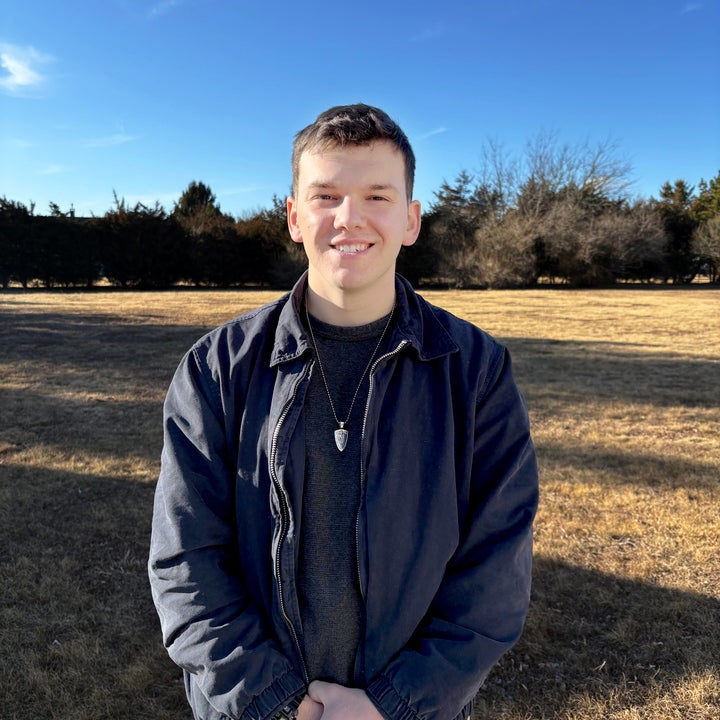Justin Cournoyer, Political Science and Criminal Justice and Criminology, plans to graduate this coming spring with law school on the horizon. Cournoyer has always had an idea for what his future would look like, and his time at URI has helped forge that path. Learn more about his experience as a student, a teaching assistant, researcher, and National Guardsman below.
Why did you choose URI?
I am originally from Cumberland, RI and knew I wanted to stay close to home. I was torn between URI and Providence College, and ultimately I ended up here. It was actually really helpful with the transition from high school to college because a large percentage of my high school class enrolled here, too. So I was able to see familiar faces just walking around campus, working at the corner store, and so on.
Did you know what you wanted to study prior to enrollment? If not, what led you to your current field of study?
I’ve always known where I wanted to end up. In the fourth grade my teacher said I could be president one day. I took that very seriously, but around middle school, I knew I should probably be a little more realistic with my goals. That’s when I started to think about law school and potentially politics down the line. So, by the end of high school I started thinking about how to get on the path I’m currently on. I originally enrolled as a political science major and then I added CCJ as a second major during my first semester.
What has your experience been of being enlisted in the National Guard?
I enlisted in the National Guard two weeks after graduating high school. From there, you go to Basic Training, and then you serve one weekend a month and typically three weeks in the summer called Annual Training. I’ve been a full-time student my entire contract and there is no full-time service obligation after I graduate. However, I want to be sure to point out that it can become a full-time obligation in the case of a war or domestic emergency; I was nearly sent down to Florida for the floods. Overall though, it hasn’t interfered with my academics, and my tuition is paid for. My current contract is up in 2027.
I was a part of ROTC at URI for one semester during my sophomore year. It was a positive experience, but you have to contract for a four to six year continuation, and that would have been committing myself until I was 26 or 28 years old. Ultimately, it didn’t feel like the right decision at the time because I knew what I wanted to do with my future. I’m still very friendly with the people I interacted with in the program.
How did you become a teaching assistant?
This is my second semester doing it, and I’ve taught for PSC 210 “Theories and Applications of American Politics” with Dan Carrigg; and now CCJ 230 “Crime and Delinquency” with Chelsea Farrell. It’s been a positive experience, absolutely. It’s been nice to feel like I’m starting to give back to the university now that I’m in the later chapter of my undergraduate career. I remember when I was a sophomore taking these classes, and now I’m in a position to set up students behind me to succeed, and hopefully achieve the same success that this university has enabled me to attain – it’s been an extremely rewarding experience.
Is law school next on your agenda?
Yes! All 12 of my applications were sent out right before Thanksgiving. I should hear back from all of them by mid-February, and if I get in, I’ll make a decision by April.
Ever since I was little, I’ve wanted to go to Boston College; my dad has always been a huge BC football fan, so they’ve been on my radar forever. As I got older I realized that it was a very prestigious college. Since expressing my interest there, the support from my professors at URI has been amazing. They’re helping me make connections and network with people at BC, and the alumni community at BC are very active in helping me get there.
The truth is I want to end up working for a DA’s office or prosecutor’s office. They are the actors that have the most power and discretion in the justice system. They decide which cases go and which are dropped. I saw a TedTalk when I was 15 and Adam Foss spoke about his position as a prosecutor in Boston and how he made a positive impact. Often this role is perceived as locking someone up and throwing away the key. He showed another side of this career by helping people who deserve second chances, and offering them a path to succeed. That’s what I want to do.
What advice would you give incoming students who want a similar path as yours?
My experience at URI is that it is what you make of it. I had a hard time my freshman year because I had so much time on my hands and I didn’t know what to do with it. So, I started to get more involved by working at the Corner Store, ROTC, and networking with my classmates. Through my classwork and good grades, I was invited by faculty to work on research and internships, and that led to my TA appointment. Over time, those rolled into letters of recommendation for law schools. So, it’s really about making it happen for yourself but also finding the people that help you grow and develop into the person who can do that.
Even working at the Corner Store, you see half of the campus on any given day. So you’re constantly meeting new people who come from all different perspectives, majors, and parts of the country – so the networking and relationships there have been incredible.
Community is everything.

